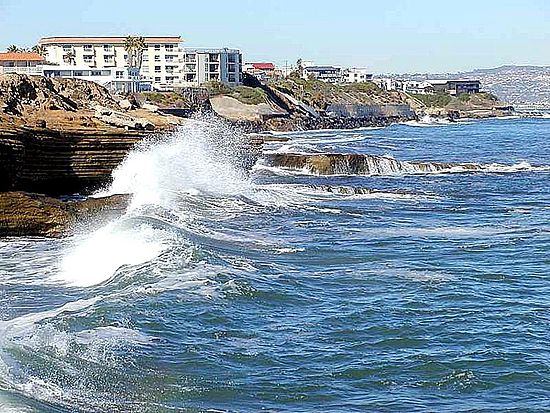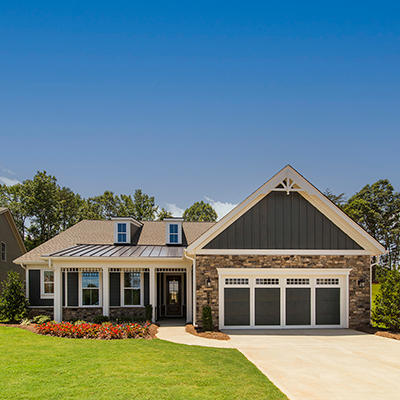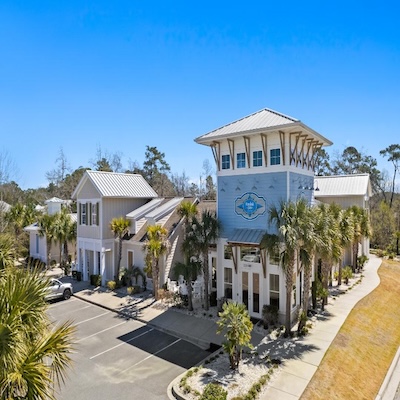New Florida Law, SB 154, Sends Tsunami Towards Florida Condo Market
Category: Active adult communities
Update June, 2023 – In another development, Governor DeSantis recently signed the much anticipated Surfside Glitch Bill, SB 154, into law. The bill relieves some of the ambiguity in SB 154. It also provided relief for some provisions of the law such as allowing a Milestone Inspection to be provided by a team of professionals with an architect or an engineer acting as a registered design professional in charge of the report (the supply of inspectors was an issue). Other clarifications had to do with reserve requirements. In one provision, reserves are not needed for replacement costs for items for which the estimated remaining useful life exceeds 25 years (but reserves are still required for deferred maintenance for those items).

November 13, 2022 — Hurricanes Ian and Nicole were bad enough, destroying thousands of homes, changing the coastline, and scaring residents and real estate buyers alike. But a new Florida law, SB 4-D: Building Safety, is about to provide a potential killer wave to the Florida condo market.
The Building Safety Law is a reaction to the tragic Surfside building collapse in Miami in 2021. It has several key requirements for condominium associations that most are not yet aware of, especially how fundamentally those will affect their finances. This article will attempt to give a quick snapshot of what is now required, and how things will change. We recommend that if you are on a condo board you get familiar with the law now, because it has several new requirements. As it spells out clearly, failure to meet them is a breach of an officer’s and director’s fiduciary relationship to the unit owners. Sadly, the jailhouse humor going round is that it could cause mass resignations of board members across the state. Even if you are not a board member, you should make sure that your board is working on this issue.
The Legislature finds that maintaining the structural integrity of a building throughout its service life is of paramount importance in order to ensure that buildings are structurally sound so as to not pose a threat to the public health, safety, or welfare.
From Florida SB 4-D – Building Safety
Two key components
There are several components of the changes coming, but we will discuss the two major ones here. The new requirements go into effect Dec. 31, 2024 and mostly affect buildings of 3 stories or more.
- Milestone Inspection Study
- Structural Integrity Reserve Study

Milestone Inspection Study
Existing buildings must have a milestone study by the end of the year in which they reach 30 years of age (built before July, 1992), or 25 years if within 3 miles of the coastline. Phase 1 of the Inspection Study is a visual examination by a qualified architect or engineer. Phase 2 is required if deterioration is detected. The inspection reports must be made available to owners and local building officials. Failure to comply is a breach of fiduciary responsibility by the officers and directors of the Board. The inspections need to be repeated every 10 years.
Structural Integrity Reserve Study
Associations existing on or before July 1, 2022 must have a structural integrity reserve study completed by December 31, 2024, for each building on the condominium property that is three stories or higher. The study must include, at a minimum, the following items as related to the structural integrity and safety of the building (some of these are new):
a.Roof
b.Load-bearing walls or other primary structural members
c.Floor
d.Foundation
e.Fireproofing and fire protection systems
f.Plumbing
g.Electrical systems
h.Waterproofing and exterior painting
i.Windows
j.Any other item that has a deferred maintenance expense 1067 or replacement cost that exceeds $10,000.
At a minimum, a structural integrity reserve study must identify the common areas being visually inspected, state the estimated remaining useful life and the estimated replacement cost or deferred maintenance expense of the common areas being visually inspected, and provide a recommended annual reserve amount that achieves the estimated replacement cost or deferred maintenance expense.
So what’s the big deal
OK, so we laid out the two major components of the changes to Florida’s condo laws. Believe us, there is a big deal in here.
First of all, condo associations have to realize they must complete their Milestone Inspection Reports by the required dates (Dec. 31, 2024 for most). If they don’t complete the inspections and provide the reports to owners and local building officials, they are in breach of fiduciary responsibility. If phase 1 of the inspection shows problems, they have to move on to phase 2.
Second of all, and most important, most associations’ reserve funds are woefully inadequate. Replacing the 10 required reserve items at today’s prices will be astronomical, even if they have to be funded over their useful life. Catching up will dramatically increase condo fees paid by owners – enough that some will not be able to pay them. Several factors are driving these huge increases:
Reserves for 10 categories must be calculated at full replacement cost. Full replacement cost will be a challenge. But compounding that, they can not be used for other purposes (such as funding insurance premiums) or other categories of expenses. Roof reserves have to be used for roofs, foundation dollars for foundations, etc. Some of these categories, such as windows, were not typically covered in reserves by many associations, adding to the total amount needed to be reserved.
Reserves have to be funded in full. An annual “fully” funding reserve contribution does not require a vote amongst association members. A majority vote is required when an association decides to collect less than the annual “fully” contribution amount. Effective December 31, 2024, members of a unit-owner controlled association may not vote to use reserve funds, or any interest accruing thereon, that are reserved for (the big 10 items) for purposes other than their intended purpose.
Bottom line
Your editor recently attended an online seminar of this bill. There was a lot of gallows humor – suggesting that many condo boards will resign rather than face angry owners confronted with having to fully fund reserves all at once, as well as recommendations to buy retirement real estate in some state other than Florida. The new law has a noble purpose, but its implementation is going to cause a lot of heartburn in the next few years. However, since the law is new and people have not had much time to digest it, the possibility that it will change in the next few legislative sessions is high.
“So you are telling me the law goes into effect Dec. 31, 2024? Good, that tells me I need to have my resignation letter as a board member sent in by the previous week.”
Client
We know of one FL condo building with 62 units that is voting to add $300,000 next year to its reserve funds (up from just over $200,000 in 2022), and that is only 50% of what is actually required to be fully funded. The point is that the law affects just about every condo association in Florida (at least the reserve funding portion), so now is the time to get started complying. Even if your Association is not in Florida, good management practice means you should incorporate the sense of the law’s requirements.
For further reading: Building Collapse Highlights Serious Challenges to Florida Condo Boards






Comments on "New Florida Law, SB 154, Sends Tsunami Towards Florida Condo Market"
RichPB says:
Makes me glad we didn't follow through on thoughts of condo purchase several years ago.
Ron says:
We avoid Florida TOTALLY! To many bad things happening there
Jennifer says:
Ron,
I have an Aunt in Naples, Florida and for the life of me, I will never live in that state. The snakes, bugs,
hurricanes, and perpetual heat are a turn-off for me. They have water issues in Ft. Myers and forget the possibility of eating anything from the Gulf for now.
I love the change of seasons, and the older I get the more I appreciate them. I am not a fan of hot humid weather and we get plenty of that in the DC area. I have been looking in northern locales for a possible retirement destination. When retired, ome can either not go out in the snow or travel to where there is less of it for a few weeks each winter.
John Brady says:
You could actually make the case that this law puts Florida in a better place than almost any other state when it comes to the condo market. That is because the law is proactive and seeks to protect buyers down the road. In other states, where condo laws barely exist, owners are not only unaware of potentially dangerous building conditions, but will face huge financial surprises with little or no reserves when serious problems occur. Just this week we learned of an upscale condo building in PA where the board has collected no reserves. Their answer, if something happens, will be to have an assessment to cover it. At the same time the building faces a hugely expensive elevator renovation that new buyers were unaware of when they bought into the building. A required inspection report like Florida requires would have made that obvious to prospective new buyers.
VTRetiree says:
Jennifer, A lot of people seem to love the Wells Maine area, I love & live in Vermont but it is very expensive to live here. Have visited Maine for number of years in early fall & love it. Winters are long but if you can escape for a month or so you can have the best of both. I would love to live on water both summer & winter but my pocketbook doesn't stretch that big. Good luck..
Daryl says:
Building are are allowed to be 30 years old before they have to start these inspections? It should be every 5 years. Especially in places having such destructive weather. And why does it apply only to buildings over three stories? Jeeze, I thought this would be a given for condos and apartment buildings. No professionals on these boards? I wouldn’t trust a bunch of my neighbors making these decisions. Where are the federal laws? One more reason to stay in my home. We budget reserves for a new roof, etc, and I can trust “the board” of two to do the right thing.
Jennifer says:
Daryl, I live in a co-op in Washington DC. We have a very healthy reserve fund od several million dollars, and our fees will rise by 7% in January 2023. Our buildings were built in 1929 and have large spacious and well-constructed apartments. we have been replacing the roof on four of our five buildings and replaced and updated the fire and gas systems last year. We have projects such as replacing all the electrical wiring in our future, Our fees cover everything-even taxes- except for the phone and the internet. We are on about 12 acres total and so we also have grounds to maintain. I have often thought that if I had a single-family home as I had in years past, I would also have to maintain a reserve fund for maintenance We manage our complex ourselves and have professionals on the Board who donate their time. Thank goodness. I am a single woman and it is difficult to keep up, but I do have a part-time job which helps.
VTRetiree, I have spent much time in Vermont and love it there better than Maine. I have looked in New Hampshire and Massachusetts, as well as friends from here, have retired to both states. We seem to have a huge group of people who summer in Maine from DC as well. Upstate New York has not been ruled out either. Thanks for your reply to my post.
Daryl says:
So, sorry to belabor the point, but how could those new owners in the PA condo John mentioned have protected themselves? Do you have to bring along a building inspector and real estate attorney on your 3-day visit? I really thought condo living would be the best of both worlds in retirement —some control, yet not the burden of total maintenance. And I thought regular safety inspections were common sense. I don’t understand this mentality— do these boards just close their eyes and cross their fingers hoping they’ll be gone or dead before the place falls apart and major repairs come due?
RichPB says:
Daryl, yes, you do at some point before committing, need to get your own inspector and attorney involved. After 30 years in your situation we are buying a 2-story townhouse (insurance views shared-wall residences as "condo"). A rational person will assure safety, integrity and HOA concerns up front, in their own interests.
John Brady says:
I love these comments on this important topic, and look forward to more. Daryl's comment that he "thought condo living would be the best of both worlds in retirement" resonates with me, it is easier in retirement than owning a home (but not as easy as renting). Condo or association living is a form of living that offers greater amenities and resources at less cost because the expenses are shared. If my roof goes, I would rather have 60 people chipping in to pay for it than just me. Same goes for having the pool cleaned. But living in a community with a Home Owners Association also means responsibility. You have to ask a lot of questions and look at documents before you buy. What kind of shape are the reserves in? Have there been assesments? Getting an expert opinion is always a good idea. You might not need a building inspector, but you could find out if the condo board has ever hired one. Likewise when you are an owner, you can't just stand back and hope other people pick up the slack. Attend meetings, run for the board, get on a committee. If you don't get involved, don't criticize and don't blame others if things go south. Communal living means taking some responsibility.
david hutchins says:
well stated John Brady! If more people would do as you stated and quit with the finger pointing and complaining, more could be accomplished. and smoother operations would make life more simple.Thank you
Jennifer says:
One thing I wanted to mention was that after the collapse of the condo buildings in Florida, we did indeed hire an inspector to look at all the supporting columns in our parking garages which are on the lower levels. We came out with a good report with one or two minor issues to attend to. We are nowhere near an ocean, but since our buildings are getting close to 100 years old, we did not want to take a chance. We also inspected all the fire alarm systems and are working on making sure that every unit has an alarm system for fire and not just in the hallways. We did discover that in some of the larger units residents could not hear the fire alarms, especially if they were elderly and hard of hearing. The walls are solidly built with plaster and very thick and there is steel and concrete between each floor, the ceilings are ten feet high and the structure is brick. Lots of things to consider. If one lives near the top of a building or under a roof, I would encourage an inspection if buying a condo or in a co-op.
Daryl says:
Dave, I would certainly get involved, but probably be one of the pain-in-the-asses who push for frequent inspections and funding reserves, so how welcome would that be when others want to keep expenses low? Trying to minimize my stress as I get older. And how does a regular person with no experience in these matters get up to speed? Or do you learn by attending? Silly naive questions, I’m sure, but feel it nevertheless.
Daryl says:
Jennifer, it’s good to hear a woman so knowledgeable and involved, because I’m actually a female (thanks again for that name, Mom,) married to a guy who doesn’t seem as concerned as I am about planning for our next home. Or should I say final frontier. And I want to be on top of all of this when we make the next move.
Clyde says:
When we bought a condo in southeast Florida eight years ago, we were fairly certain we weren’t interested in a high rise for various reasons. We ended up buying our condo in a 55+ community in which none of the buildings were over two stories, basically garden-style units. Unbeknownst to us at the time, that decision was fortuitous in terms of the new condo reserve and inspection laws going into full effect in 2024. Since we don’t have to start putting funds into certain reserves in preparation for the 2024 changes, our 2023 HOA fees will be only about 5% higher. Our reserves for other purposes have been essentially fully funded during the time we’ve lived in our condo and, consequently, we’ve never had a special assessment. I did take a look at the HOA budget records for the previous 2-3 years before we bought. As to why the legislature decided to apply the new laws only to buildings of three stories or more, the structural and engineering needs of 2-story condos are considerably less and different from high rises. In addition, many single family dwellings in Florida are also 2-story. To be fair, the legislature would have needed to apply the new laws to these structures, if all condos, regardless of numbers of stories, were to be covered by the new law. Although the market for condos three stories or may be negatively affected by the reserve and inspection requirements, conversely, condos of two stories or less will likely become more attractive in terms of HOA fees. That should enhance the value of such properties.
Mark Reed says:
Clyde, please look on the Florida Division of Condominiums, Timeshares and Mobile Homes website, where you can find the following:
Q: I live in a 2-story condominium. Is our association still permitted to waive reserves?
A: The Division does not consider this provision to base an association's ability to waive reserves on the number of stories that an association's buildings have.
As background, I am the president of the association for a two-story condominium association in Pensacola. After reading the text of SB 4-D, I decided to check with our attorney on the applicability of the fully-funded reserves to our building. She said that while the three-story and higher rule applies to registration and safety inspection, it DOES NOT apply to fully-funded reserves, which are required for all by 31 December 2024.
Clyde says:
Mark, appreciate the information. In your understanding, does the last sentence of your post mean that all condo HOA’s, regardless of size or number of stories, must fully fund all of their reserves (roof, painting, elevator, etc.) by the end of 2024? Thanks.
Admin says:
A realtor in Jupiter, FL reports that at least 30 or so of the houses his firm sold recently came on the market because the owners could not afford the insurance premiums their mortgages required. Most of those homes were in turn bought by cash buyers who did not need a mortgage, so they did not need to have insurance.